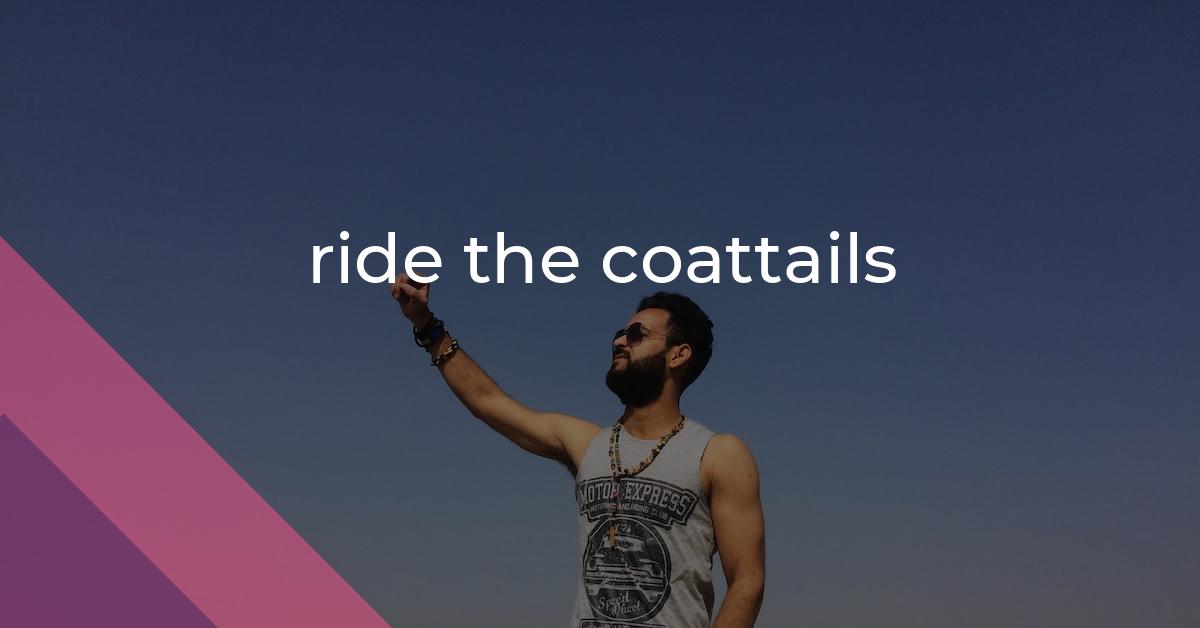ride the coattails: Idiom Meaning and Origin
What does ‘ride the coattails’ mean?
"Riding the coattails" means to benefit from someone else's success or achievements without making any effort or contribution of your own.

Idiom Explorer
The idiom "ride the wave" means to go along with or take advantage of a favorable situation or trend. It implies adapting to the circumstances and enjoying the success or benefits that come from it.
"Ride the rails" is an idiom that means to travel by train, often used specifically to refer to the experience of being a hobo and illegally hopping on trains to get from place to place.
The idiom "ride the crest of the wave" means to experience great success or to be at the peak of a positive situation. It emphasizes seizing opportunities and enjoying the benefits of being in a favorable position.
The idiom "ride tall in the saddle" means to display confidence, authority, and control in a situation. It is often used to describe someone who is self-assured and in a position of power.
The idiom "ride roughshod over" means to act without caring about or considering the opinions, needs, or feelings of others, and to treat them in a harsh or unfair manner.
The idiom "ride out" means to endure or survive a difficult situation or problem without giving up or being greatly affected by it.
"Ride on the back of" means to take advantage of someone or something for personal gain, without making an equal contribution or effort.
The idiom "ride one's luck" means to depend on chance or luck, often in a risky or daring situation, rather than on one's own skills or abilities. It suggests taking advantage of favorable circumstances without having much control over the outcome.
The idiom "ride one's bumper" means to follow closely behind someone's vehicle, often without maintaining a safe distance, which can be considered aggressive or intrusive behavior.
The idiom "ride off into the sunset" means to have a happy or satisfying ending or departure, often in a romantic or idealized way.
The Hidden Influence
The idiom "ride the coattails" has a clear and widely known meaning in American English. Its origins can be traced back to the early 19th century, and it is often used in a figurative sense to describe someone benefiting from the success or accomplishments of another person. The phrase can also imply that the person riding the coattails has made little or no effort of their own to achieve their current position or recognition.
In the literal sense, coattails refer to the long flaps or extensions at the back of a tailcoat, a style of formal jacket popular in the 18th and 19th centuries. These coattails were primarily decorative and served no practical purpose. They were often worn by nobility and individuals of higher social status, signifying prestige and influence.
When used figuratively, "ride the coattails" suggests that a person is taking advantage of another's success or reputation for their own gain without having put in the necessary effort or contributing anything substantial themselves. In other words, they are relying on the accomplishments or popularity of someone else to gain recognition or achieve their own goals.
This idiom is commonly used in both casual conversations and formal contexts, such as in literature, politics, and business. It can be used to criticize individuals who are perceived as lacking originality or creativity and instead rely on the work or achievements of others to advance their own interests.
For example, in the realm of politics, "riding the coattails" can refer to a lesser-known candidate benefiting from the popularity or endorsements of a more established politician. This is similar to the idioms "ride on the back of" and "free ride," which both convey the idea of benefiting or taking advantage of someone else's success or hard work.
Similarly, in the entertainment industry, "riding the coattails" might describe a lesser-known actor or musician gaining attention because of their association with a more famous or influential individual. This is comparable to the idioms "ride the wave" and "ride the crest of the wave," which suggest riding on the momentum or popularity of a trend or a successful person.
The idiom "ride the coattails" can also be linked to the expression "pull oneself up by one's bootstraps," as both idioms touch on the concept of relying on external factors for personal success. While "ride the coattails" implies benefiting from the accomplishments of others, "pull oneself up by one's bootstraps" emphasizes the idea of self-reliance and hard work to achieve success.
However, it's important to note that using the idiom "ride the coattails" does not necessarily imply negative intent or malice. There can be instances where individuals genuinely learn from, collaborate with, or are inspired by others in their pursuit of success. But the context in which the idiom is used often carries a connotation of opportunism or exploitation.
"Ride the coattails" is an idiom deeply rooted in the English language, with a clear figurative meaning of benefiting from the accomplishments of others without putting in the necessary effort or contributing meaningfully. Its historical ties to the decorative flaps on tailcoats add an additional layer of symbolism to the phrase. While often used in a negative context, it can also describe legitimate instances of learning, collaboration, and inspiration. As with many idioms, the interpretation and usage of "ride the coattails" may evolve over time, allowing for a range of nuanced meanings.
Example usage
Examples of how the idiom ride the coattails can be used in a sentence:
- After failing to contribute anything substantial to the group project, she managed to ride the coattails of her hardworking teammates to receive a good grade.
- The inexperienced politician tried to ride the coattails of his popular mentor, hoping that his association would boost his chances of winning the election.
- Some people try to ride the coattails of famous celebrities by pretending to be close to them, hoping to gain attention and fame themselves.
More "success" idioms



